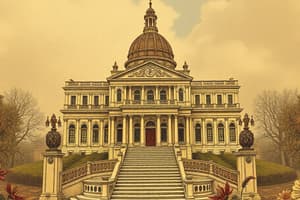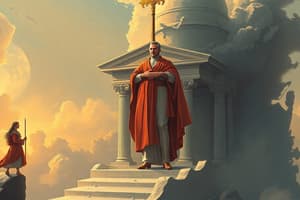Podcast
Questions and Answers
What is the primary purpose of the Separation of Powers?
What is the primary purpose of the Separation of Powers?
- To enhance the efficiency of government operations.
- To ensure no one individual or group holds excessive power. (correct)
- To allow for direct democracy in governmental decisions.
- To consolidate power in one branch of government.
Which branch of government is considered the most dangerous according to the content provided?
Which branch of government is considered the most dangerous according to the content provided?
- Legislative branch.
- Administrative branch.
- Judicial branch.
- Executive branch. (correct)
What happens when the branches of government disagree with each other?
What happens when the branches of government disagree with each other?
- Legislation is passed swiftly.
- Judicial review begins immediately.
- A collaboration occurs across branches.
- A gridlock situation arises. (correct)
According to Montesquieu, what can result if one person holds powers across multiple branches?
According to Montesquieu, what can result if one person holds powers across multiple branches?
What principle does Montesquieu emphasize regarding the relationship between powers?
What principle does Montesquieu emphasize regarding the relationship between powers?
What significant change did Turkey implement that affected the Separation of Powers?
What significant change did Turkey implement that affected the Separation of Powers?
What is a potential consequence of an absence of the Separation of Powers?
What is a potential consequence of an absence of the Separation of Powers?
Which of the following best describes a key feature of the Separation of Powers?
Which of the following best describes a key feature of the Separation of Powers?
What principle asserts that one branch of government should not exercise the powers of another branch?
What principle asserts that one branch of government should not exercise the powers of another branch?
Which characteristic of the Separation of Powers allows a branch to hold another accountable?
Which characteristic of the Separation of Powers allows a branch to hold another accountable?
Why does Montesquieu favor a monarchy over democracy?
Why does Montesquieu favor a monarchy over democracy?
In the UK, what is a significant overlap between branches of government?
In the UK, what is a significant overlap between branches of government?
What is one reason why the judiciary is considered the 'least dangerous' branch?
What is one reason why the judiciary is considered the 'least dangerous' branch?
Which case highlighted the need for judges to avoid ruling on socially significant issues?
Which case highlighted the need for judges to avoid ruling on socially significant issues?
What is a major limitation faced by the judiciary in the context of the executive?
What is a major limitation faced by the judiciary in the context of the executive?
What term refers to the ability of legislation to address moral welfare and safety within a state?
What term refers to the ability of legislation to address moral welfare and safety within a state?
Which inquiry examined the UK's decisions regarding Iraq and aimed to identify lessons learned?
Which inquiry examined the UK's decisions regarding Iraq and aimed to identify lessons learned?
How do judges contribute to lawmaking despite their primary role as interpreters?
How do judges contribute to lawmaking despite their primary role as interpreters?
What fundamental principle does the Separation of Powers aim to prevent?
What fundamental principle does the Separation of Powers aim to prevent?
Which of the following statements best illustrates the UK’s approach to the Separation of Powers?
Which of the following statements best illustrates the UK’s approach to the Separation of Powers?
Which of these is NOT a recognized characteristic of the Separation of Powers?
Which of these is NOT a recognized characteristic of the Separation of Powers?
What is the significance of Section 3 of the Human Rights Act 1998?
What is the significance of Section 3 of the Human Rights Act 1998?
What changed in the role of the Lord Chancellor after the Constitutional Reform Act 2005?
What changed in the role of the Lord Chancellor after the Constitutional Reform Act 2005?
Prior to the Supreme Court's establishment, what dual role did the Law Lords function in?
Prior to the Supreme Court's establishment, what dual role did the Law Lords function in?
Why is the reform of the Lord Chancellor's role considered significant?
Why is the reform of the Lord Chancellor's role considered significant?
The Supreme Court was established to improve public confidence in which of the following?
The Supreme Court was established to improve public confidence in which of the following?
What aspect does Section 6 of the Human Rights Act 1998 concern?
What aspect does Section 6 of the Human Rights Act 1998 concern?
Which of the following statements accurately summarizes the checks and balances in government?
Which of the following statements accurately summarizes the checks and balances in government?
What is a consequence of the Lord Chancellor no longer being the head of the judiciary?
What is a consequence of the Lord Chancellor no longer being the head of the judiciary?
Which concept was violated by Law Lords sitting in the House of Lords?
Which concept was violated by Law Lords sitting in the House of Lords?
What role did the Lord Chancellor historically play in relation to the three branches of government?
What role did the Lord Chancellor historically play in relation to the three branches of government?
Flashcards
Separation of Powers
Separation of Powers
The principle that government power is divided between three separate and distinct branches: the legislative, executive, and judicial.
Legislative Branch
Legislative Branch
The branch of government responsible for making laws.
Executive Branch
Executive Branch
The branch of government responsible for carrying out laws.
Judicial Branch
Judicial Branch
Signup and view all the flashcards
Checks and Balances
Checks and Balances
Signup and view all the flashcards
Gridlock
Gridlock
Signup and view all the flashcards
Tyranny
Tyranny
Signup and view all the flashcards
Why is Separation of Powers Important?
Why is Separation of Powers Important?
Signup and view all the flashcards
Personnel Separation
Personnel Separation
Signup and view all the flashcards
Judicial Independence
Judicial Independence
Signup and view all the flashcards
Judicial Precedent
Judicial Precedent
Signup and view all the flashcards
Parliamentary Sovereignty
Parliamentary Sovereignty
Signup and view all the flashcards
Judicial Restraint
Judicial Restraint
Signup and view all the flashcards
Mutuality of Respect
Mutuality of Respect
Signup and view all the flashcards
Ouster Clauses
Ouster Clauses
Signup and view all the flashcards
Pepper v Hart Principle
Pepper v Hart Principle
Signup and view all the flashcards
Distinct Domains
Distinct Domains
Signup and view all the flashcards
Non-Intervention in Foreign Affairs
Non-Intervention in Foreign Affairs
Signup and view all the flashcards
Prerogative Powers Exemption
Prerogative Powers Exemption
Signup and view all the flashcards
Intensity of Review
Intensity of Review
Signup and view all the flashcards
Judicial/Public Inquiries
Judicial/Public Inquiries
Signup and view all the flashcards
Separation of Powers (SoP)
Separation of Powers (SoP)
Signup and view all the flashcards
Human Rights Act (HRA) 1998
Human Rights Act (HRA) 1998
Signup and view all the flashcards
Declaration of Incompatibility
Declaration of Incompatibility
Signup and view all the flashcards
The Lord Chancellor & SoP
The Lord Chancellor & SoP
Signup and view all the flashcards
Constitutional Reform Act 2005
Constitutional Reform Act 2005
Signup and view all the flashcards
Supreme Court
Supreme Court
Signup and view all the flashcards
Judicial Review
Judicial Review
Signup and view all the flashcards
Parliament and 'Public Bodies' (HRA)
Parliament and 'Public Bodies' (HRA)
Signup and view all the flashcards
Statutory Interpretation
Statutory Interpretation
Signup and view all the flashcards
Study Notes
Separation of Powers (SoP)
- SoP reflects the division of governmental powers to prevent any single person or group from accumulating excessive power.
- Each branch (executive, judicial, legislative) should need the cooperation of others, creating a system of checks and balances.
- Gridlock can occur when branches disagree and block each other's actions.
- A dictatorship eliminates SoP, concentrating power in the central executive. The executive often holds significant financial resources (taxes), making it a potentially dangerous branch.
- Turkey's shift to a presidential system, concentrating power in the executive, is an example of weakening democratic checks and balances.
SoP and Montesquieu
- Montesquieu, a French nobleman, is associated with the well-known SoP doctrine (The Spirit of the Laws, 1748).
- He believed that power should be checked by power to prevent tyranny.
- Montesquieu preferred a monarchy for the executive, believing it provided stability.
- He emphasized the importance of reading his complete work.
Aspects of the SoP Doctrine
- Functional Separation: Prevents one branch from performing the functions of another.
- Personnel Separation: No individual should hold positions in multiple branches.
- Checks and Balances: Each branch can check and hold accountable the others.
SoP in the UK and Comparison with the USA
- The UK's separation is not as strong as the USA's, partially due to historical circumstances and the Crown's previous significant power.
- The UK has overlaps between branches, especially the executive and legislative (Ministers are also MPs).
- The key question is whether the UK has enough SoP to prevent abuse of power.
Constitutional Relationships
- Legislature and Judiciary: Both make laws but are theoretically separate.
- Executive and Legislature: Ministers must be MPs;
- Executive and Judiciary: Courts can review executive actions; prerogative powers have overlap & are not subject to the same level of judicial review (executive powers).
SoP and Judiciary
- The judiciary is considered the least dangerous branch due to its relative passivity.
- Judges are interpreters and sometimes creators of precedents. Judges should avoid ruling on highly sensitive social issues.
Relationship Between Parliament and Judiciary
- Parliament has supremacy over the courts. Constitutional conventions exist to maintain relations.
- Judges develop common law and interpretations that fill gaps in legislation.
- The tension between Parliamentary sovereignty and judicial review is reflected in cases like Shaw v DPP, Anisminic, Pepper v Hart etc.
- Conflicts can arise regarding the interpretation of laws, e.g., R v Brown, Hamilton v Al Fayed.
Relationship Between Executive and Courts
- Executive and Courts can overlap but each have distinct, largely exclusive domains..
- Judicial review over some executive actions is limited, especially in affairs related to foreign policy and treaties.
- The Courts can check executive decisions via judicial review, but not regarding some key prerogative powers of the executive. (see GCHQ) Review is not possible for key prerogative powers.
Judicial Inquiries
- Inquiries like the Chilcot Inquiry scrutinize government decisions and actions.
- Judicial/Public Inquiries can be done over the executive's decisions (e.g., report of arms sales).
Human Rights Act 1998
- Sections 3 and 4 of the HRA limit the scope of judicial interpretation and preserve parliamentary supremacy.
- Section 6 expands the scope of judicial review to "public bodies".
SoP and Reform
- The Constitutional Reform Act (2005) created the Supreme Court and reformed the role of the Lord Chancellor.
- The Lord Chancellor was initially a major example of overlap in the branches of government, holding functions in all three areas simultaneously. This position was subsequently reformed to ensure proper separation.
Supreme Court Creation
- Creating a separate Supreme Court from the House of Lords reinforced the separation of the judiciary and the legislature.
- Public confidence and understanding of the distinct roles in the judiciary and political legislative upper house were key to this reform.
Checks and Balances & Further Details
- Key checks and balances exist, including the executive needing parliamentary support and the executive being subject to judicial review.
Studying That Suits You
Use AI to generate personalized quizzes and flashcards to suit your learning preferences.




